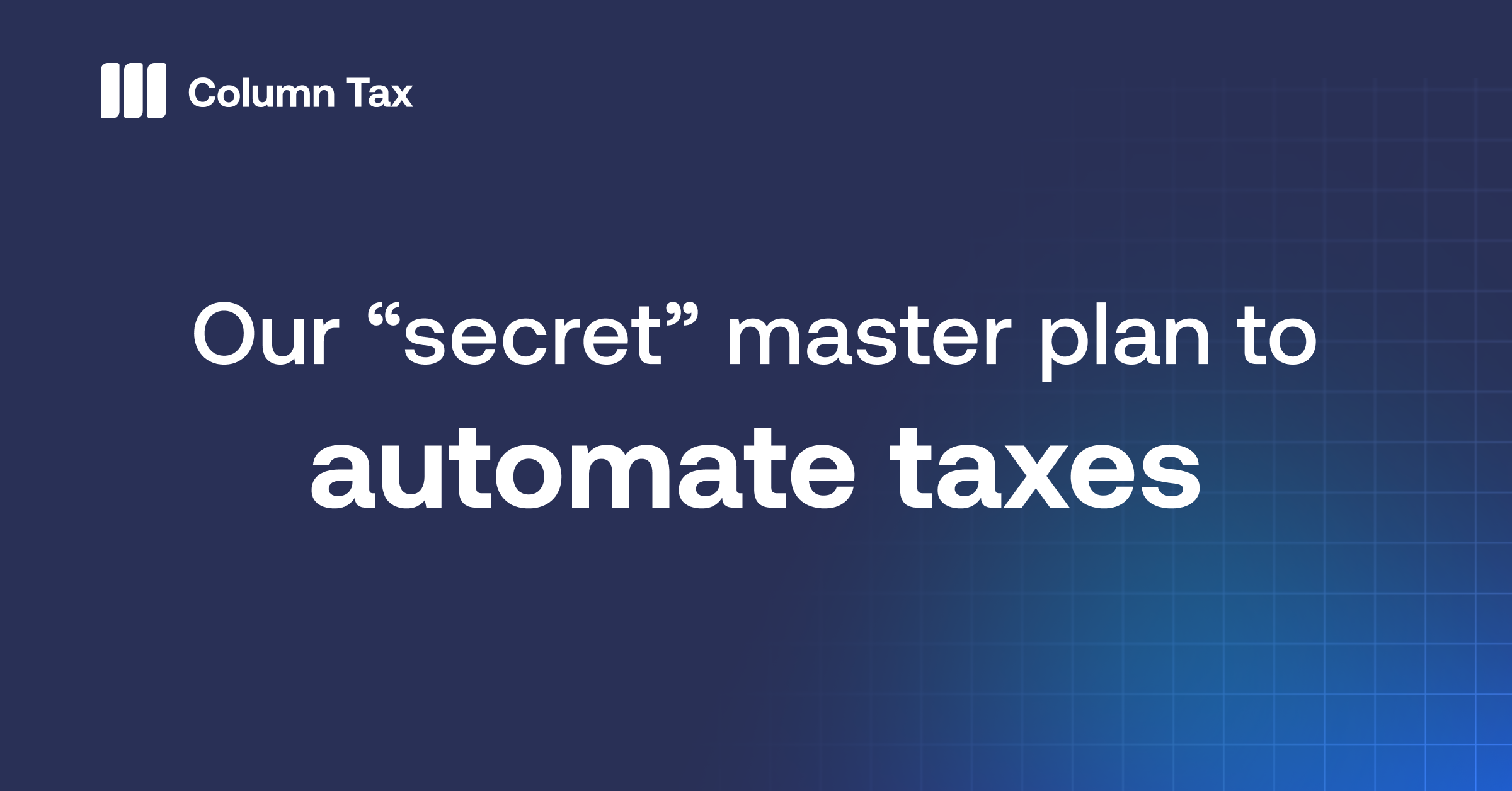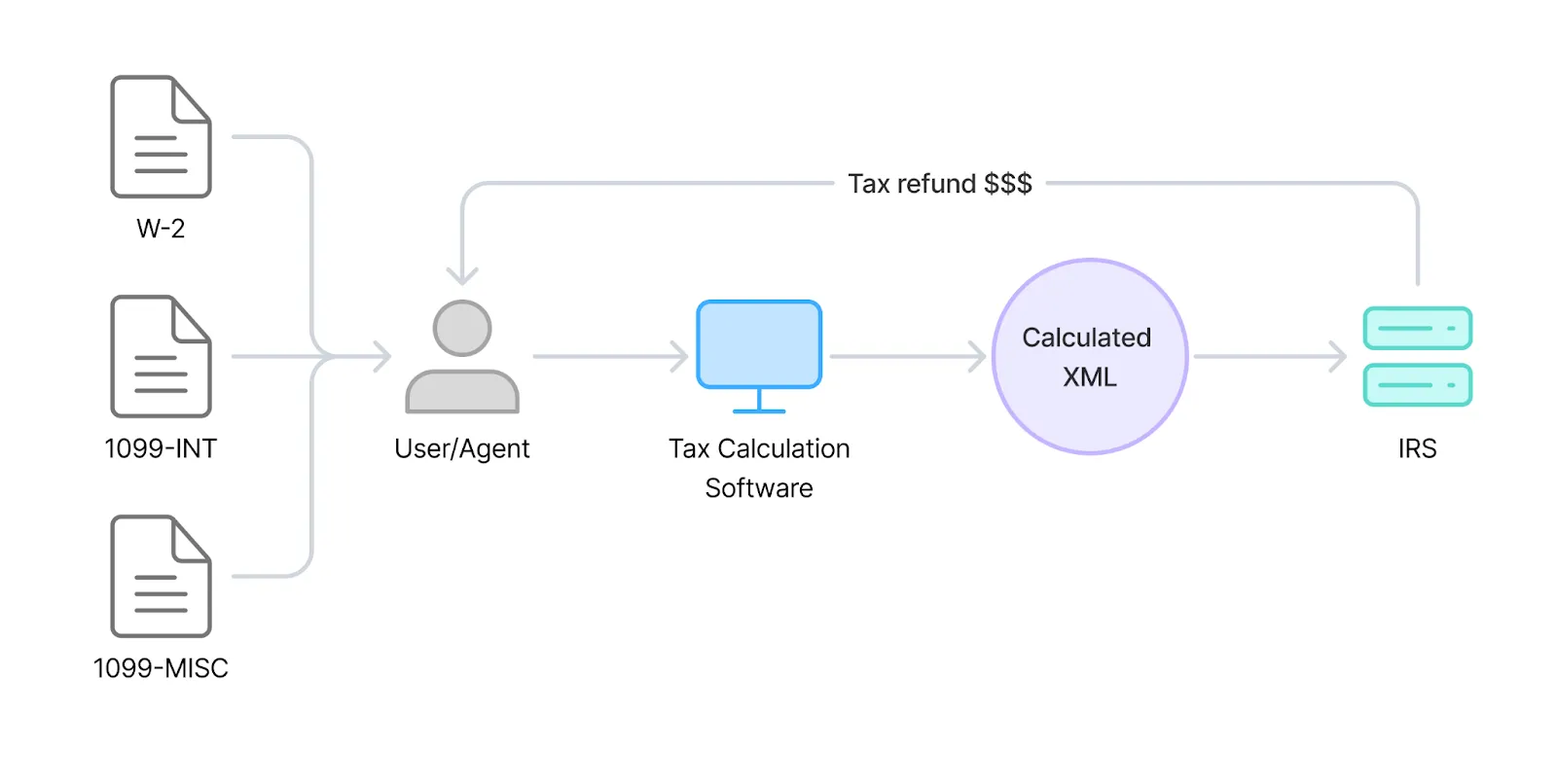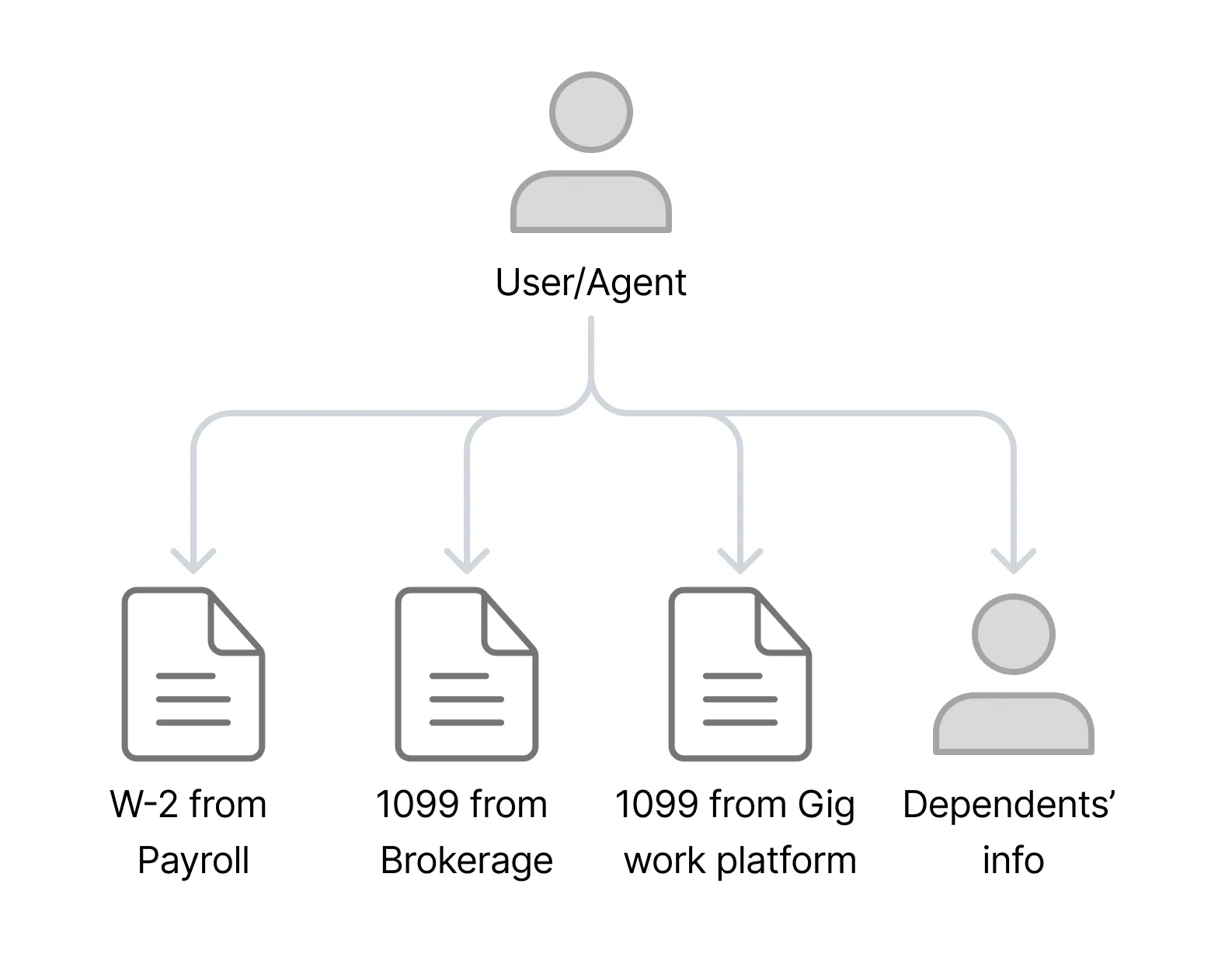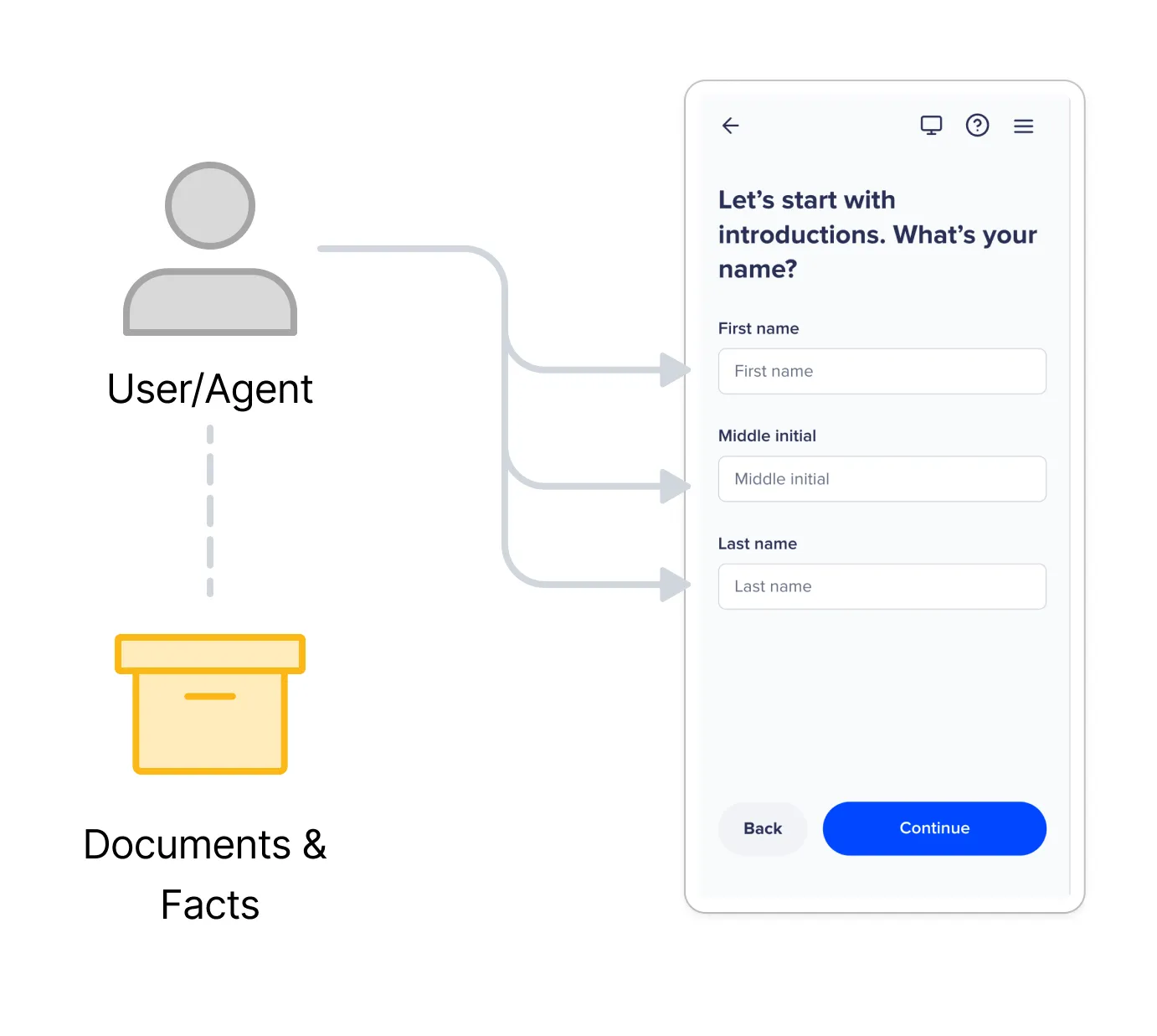Heading
Our “secret” master plan to automate tax filing

Column Tax is on a mission to make it so every taxpayer can confidently file in one click. Our first product is DIY tax filing software embedded inside banks, brokerages, and other financial service apps. Over the next few years we'll go from traditional questionnaire-based DIY tax filing to fully-automated one-click filing by building on top of our tax engine, the first personal income tax engine built in decades and the first of its kind built with a coding agent.
Today, taxpayers cumulatively spend billions of dollars and billions of hours “doing their taxes”, all while feeling stressed & confused. Column Tax is positioned to fix that by finally automating tax filing the way we all know it should be.
Imagine this future:
You've been working with the Column Tax agent throughout the year to continuously optimize your tax position: ensuring money is in the most tax-advantageous accounts, adjusting your withholdings, and making estimated payments. It’s now the end of the year and your agent pings you as tax documents are becoming available. Column Tax is able to autonomously gather all of your documents for you: it already has your 1040 from last year, of course, and based on your emails, it knows you have a W-2 from your payroll system and a 1099-MISC from your gig work platform.
It knows your filing status and dependents from last year’s filing. Without you lifting a finger, your tax agent (with your authentication & permission) used the browser and went and downloaded all your docs, analyzed them, and prepared them to be filed. Your agent just has one question for you: “I saw you booked an Airbnb in June of last year. Was that for a writer’s work retreat or for fun? If it’s the former, we can write that off as business expense.” Your answer: no unfortunately, that was just for fun!1
OK, your taxes are all done: you’ll be getting a $789 federal refund and you owe $482 to California. Your agent will double check you have enough in your account to cover the payment and will check back in 21 days to ensure your refund arrives. Your agent also adjusted your W-4 and will keep tabs on your stock trades throughout the year to make sure you don’t owe any penalties or interest. You’re all done! See you next year.
TL;DR: How Column Tax will automate taxes
Column Tax is in a unique position at a unique moment in technology history. We were one of the first companies to build & deploy an AI coding agent in any industry that requires 100% correctness. We have an extremely talented specialized team of Tax domain experts and a unique data advantage with >1 million returns submitted and tens of thousands of high-quality synthetic Tax scenario tests.
From this amazing starting point, we’ll deliver on our mission of fully automating tax filing by:
- Continuing to build out our Tax Calculation engine to support every edge case & form in tax law by using our AI tax development agent, Iris, backed by our world-class Tax domain expert team and tax return eval data set.
- Eliminating manual Tax Prep data entry by creating an MCP layer between tax input data and tax calculation & filing engine.
- Automating tax Document Collection by creating a tax information gathering agent to proactively collect documents across all sources.
The United States spends over 5 billion hours per year on income tax filing & compliance: Column Tax is the company that will automate this to free up individual taxpayers to spend time on things that matter the most to them and Tax Pros to focus on only their highest-leverage work.
Background & Motivation: why now is the moment
ChatGPT was released in late 2022 and opened the world’s eyes to the significantly increased capability of AI systems (LLMs) at text-based tasks like writing, summarizing, etc. LLMs have continued getting significantly better.
Thanks to Reinforcement Learning, between May 2024 and now, LLMs have made a significant leap in their ability to do “verifiable”2 tasks: e.g. coding, math. For competitive coding & math problems, frontier models can now reliably do >80% of these expert-level tasks (e.g. AIME, SWE-bench Verified).
This has also led to a new wave of creation of agents3 that are automating parts of work, like coding. As of this writing (mid-late 2025), agents can only do fairly short-running (i.e. minutes at most) & well-scoped tasks, but are expected to get much better as their 9s of reliability to succeed at any given sub-task improve4.
This reasoning ability has also been successfully applied to more complex tasks like computer use. See, for example, Operator (ChatGPT’s computer use agent) using our Column Tax DIY software here:
You might argue “doing your taxes” is a verifiable task and therefore also subject to the latest tools of AI. We think you’re right!
Patrick McKenzie (patio11) cites 2026-2028 as the AI industry consensus view of when LLMs can “do taxes”: that’s the view from the LLM industry. I believe (as someone who straddles both the tax software & AI industry) in order to hit that estimate, we’ll need our strong Tax domain expertise and proprietary datasets to train/utilize AI to perform in this very particular domain.
Other people at the frontier of AI research now believe that we are only “1 person month of effort” away from automating taxes5, just that no one working at Anthropic is going to dedicate time to automating this specific task when there are so many things to automate. Here’s AI Researcher Sholto Douglas on the topic:
I think Sholto is underestimating 🙃 the complexity of the task (see the full task breakdown below), but I agree that the right group of subject-matter experts with the right datasets (read: Column Tax) can automate taxes.
Taxes will be automated. It’s a matter of time, expertise, data, and effort. And I expect Column Tax will be the group that does it. Along the way, as we automate each subtask, we’ll be able to deliver value to our partners, customers, and users, building a flywheel by bringing us additional data to train on and revenue to fund further automation.
Breakdown of automating the “Doing your Taxes” task

When someone says “doing your taxes” - what’s the actual work people do? Let’s break it down. This is helpful given the current state of AI models: agents today do smaller, shorter-running tasks. “Doing your taxes” is a pretty big task, so by breaking it down into its constituent parts, we’re more likely to be able to reliably automate those parts6. We’ll also be able to deploy automation for sub-parts and create value before the entire end-to-end task can be fully automated:
- Document collection: Gather all the documents & information you need to file your taxes.
- Tax Prep, which breaks down into how you file:
- DIY: Enter all your information into DIY software, e.g. TurboTax or Column Tax.
- Pro: Enter your client's information into Pro software, e.g. UltraTax or CCH Axcess.
- Tax Calculation: What a tax engine does, the actual calculation of your returns (which can then be e-filed).
- Profit! (or really, get a refund or owe)
Automate collecting documents

Document Collection Background
In order to file your taxes, you have to collect all of the documents for the year that are going to go into preparing & computing your tax return7. This task involves finding documents across many systems, e.g.:
- W-2s from payroll providers
- 1099s from gig work platforms & brokerages
- Documents mailed to you! (e.g. a 1099-G or SSA-1099)
- Information about your self-employed business (e.g. accounting data on gross receipts, expenses)
- Facts about your life (e.g. Dependents’ SSNs)
This info is gathered in a variety of ways, depending on how you’re filing: DIY or with a Preparer.
- Some people gather all their data up front and put it in a folder on their computer, and then either send it to their preparer or begin DIY filing.
- Some people gather their data Just in Time. For example, as they're filing DIY, they’ll use the DIY software's automated data ingest capabilities (e.g. direct W-2 or brokerage connections, or API pre-fill) to pull in documents to their tax preparation.
The Document Collection Agent
We’ll build an agent that can do all of your tax documents collection for you. This agent will be able to do things like search your email, log into your financial institutions, download and analyze your documents, as well as securely store your documents and tax info. Our Document Collection Agent will extract data from these documents and ensure nothing is missing and everything looks right to file.
The document collection task is verifiable and therefore perhaps amenable to Reinforcement Learning. We’ll use RL to automate document collection. We’ll give models a sandbox representing a starting place for user document collection (e.g. an email inbox, despite how messy those inputs will be), and train its ability to fully compile the expected documents. Collecting training data for this sub-task will be hard, but easier thanks to Column Tax’s existing 1M+ return dataset.
I imagine the hardest parts of building this agent, in addition to reliability, will be figuring out authentication: in order to work reliably, this agent will need access to your logins as well as likely to your email. We expect authentication to be solved first-party by LLM providers like OpenAI (e.g. see their first foray into this via ChatGPT Apps SDK authentication documentation).
When documents aren’t available online (occasionally, some tax documents are still only available via print!), we’ll prompt the user to scan them (or someday, connect to humanoid home robots to open the mail & scan documents).
Because of the ever-improving data ingest techniques of our DIY product, I imagine solving this Document Collection subtask after some of the subtasks below (despite being the first step in tax filing and listed first in this post).
Tax Prep: Eliminate manual data entry
There are two methods to “prepare your taxes” once you have your documents and tax info collected: on your own with DIY software or via a Pro. Preparing your taxes means taking the documents and facts and inputting them into tax preparation software in the right spot. The software will then take that information to calculate and file for you.
An important part of the tax prep task is surfacing any missing information that would cause an error on the return or make the return incalculable.
Similar to the Document Collection subtask, we imagine the Tax Prep task to be verifiable and therefore amenable to Reinforcement Learning, as well as other techniques for creating reliable agents.
We will baseline AI's ability to do this task using a new eval: TaxPrepBench.
Lots of companies are working on automating this task. We believe it's the easiest of the tasks because it doesn't involve actually computing the tax return, which is left to a tax engine or fetching your data from many different places. The best version of Tax Prep automation will also happen via APIs/MCP, so Column Tax is the best-positioned company to automate this step because we have a first-party calculation engine.
Automating Tax Prep allows us to: 1) deliver a CPA-level experience to DIY users and 2) frees up CPAs to focus on higher-value work like client services like providing forward-looking insights & planning8 and can help ease the coming CPA workforce shortage9.

The Tax Prep Agent
While we could build an agent that takes your collected documents and enters them into the right spot in DIY software (for example, imagine a computer-use agent like Operator going through Column Tax, TurboTax, or Pro tax software and entering your information for you), we will take a smarter approach.
Instead, since we have a tax engine API, we’ll enable our DIY Tax Prep agent to interact with it via MCP. This allows our DIY Tax Prep Agent to directly enter the user’s documents & facts into our engine without needing to navigate a browser-based system built for users.
Tax inputs have a huge surface area: there are literally tens of thousands of input data points on a tax return (and therefore in our Tax Engine API). LLMs + MCP make this mapping easier.

Perfect Tax Calculation

Given a complete set of user inputs, this task calculates the correct XML output for the user's federal and state returns to be e-Filed.
This is the sub-task we’ve focused on the most since the start of Column Tax: originally by hand coding our tax engine and now by automating the coding of the transformations in our graph computation system that make up our engine by using Iris, our AI tax development agent. We’ve made tremendous progress here: building the first feature-complete modern personal income tax engine in the past two decades.
We've also been baselining AI's ability to do this task on its own using TaxCalcBench. Tl;dr: today’s models cannot do the tax calculation task on their own. We'll continue to experiment to see if additional tool use such as thinking, web search, and code interpretation improve model performance. And over time we'll experiment to see if Reinforcement Learning or other techniques can train models to do this task without having to output intermediate code to run. We think this approach is multiple years away, but Column Tax, with our >1 million return database, comprehensive synthetic test suite, and world-class Tax domain expert team will be the first company to be able to apply AI directly to tax calculation and be able to prove & confirm its correctness.
Summary
Column Tax has already, in its first 5 years of existence, become the first company in the past two decades to build a new personal income tax engine & grow it to scale (with over 1 million returns filed). From here, we’ll completely automate taxes by:
- Continuing to build out our Tax Calculation engine to support every edge case & form in tax law by using our AI tax development agent, Iris and eventually, AI models directly, backed by our world-class Tax domain expert team and tax return eval data set.
- Eliminating manual Tax Prep data entry by creating an MCP layer between tax input data and tax calculation & filing engine.
- Automating tax Document Collection by creating a tax information gathering agent to proactively collect documents across all sources.
Once we’ve automated taxes, taxpayers will be freed up to focus on what matters to them most, and preparers will be able to work on higher-leverage work. We’re excited for this future that’s finally within reach.
______________________________
1 This Airbnb example is from an excellent Dwarkesh podcast: https://www.dwarkesh.com/p/sholto-trenton-2 discussing testing AI models’ ability to “do taxes”.
2 Verifiable - meaning tasks where the answer can be verified, i.e. unlike writing poetry where the “best”/”right” answer isn’t perfectly known.
3 Agent is a software system that can autonomously reason, make decisions, and take actions.
4 If each sub-task that an agent does has a 90% success rate, by the time you chain 3 of those sub-tasks together, you only have a ~73% success rate on the overall task. Whereas if each sub-task has a 99% success rate, the overall success rate for 3 chained sub-tasks is ~97%
5 At the same time, they bet that “doing your taxes” as a task is likely >18 months away from being solved (i.e. not automated by the end of 2026).
6 At some point, there may be a model that is able to automate the entire taxes task end-to-end, but that seems fairly far away. I think the faster path is by automating sub-tasks and stitching those automations together. This is analogous to Tesla trying to automate driving with an end-to-end model, but being quite far behind Waymo, which has separate subsystems, for example perception, behaviour prediction, planning, etc., and is currently able to very successfully self-drive 100M+ miles.
7 We'll assume for now that you're going to continue filing your taxes using your source documents (for example, a W-2) and not yet skip to analyzing raw underlying data (e.g. weekly unprocessed payroll data).
8 Helping CPAs provide forward insights and planning is also something we will help them do using AI.
9 See https://www.kent.edu/business/accountant-shortage-united-states-everything-you-need-know for background on this shift.
Ready to get started?
.png)

